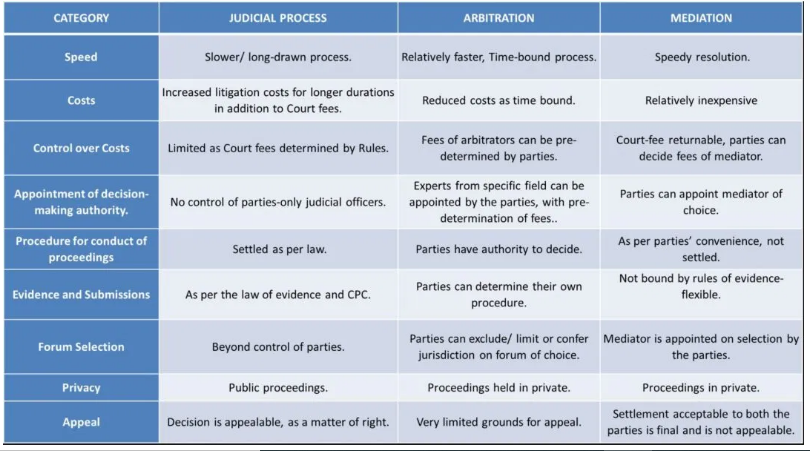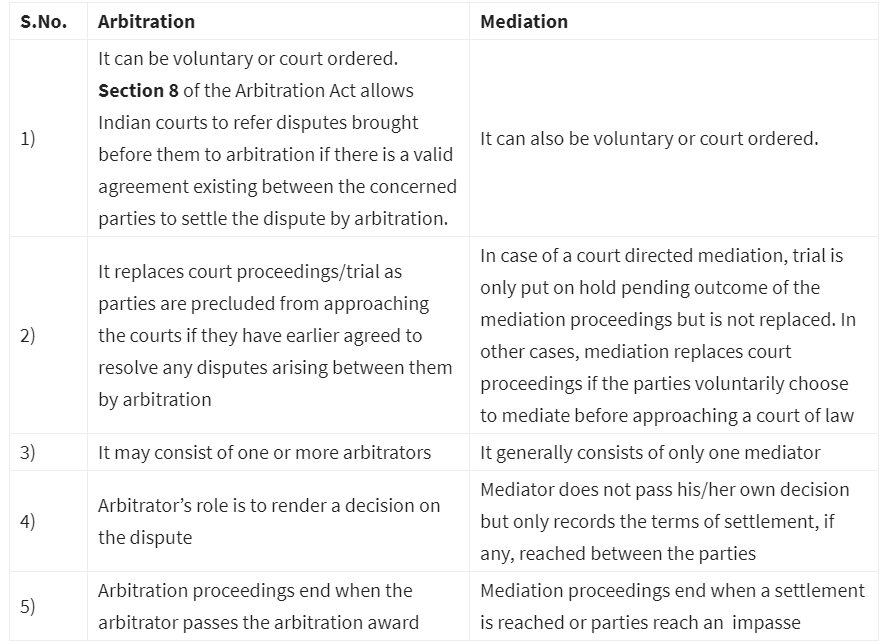Alternate Dispute Resolution Mechanism in India
2023 AUG 8
Mains >
Polity > Judiciary > Alternate Dispute Redressal

IN NEWS:
- The Mediation Bill, 2023, that aims to cut down the time to complete mediation proceedings got Parliamentary approval.
MEDIATION BILL, 2023:
- The Bill focuses on the importance of alternative dispute resolution mechanisms. It allows individuals to attempt the settlement of civil or commercial disputes through mediation before approaching a court or tribunal.
- The Bill makes pre-litigation mediation voluntary instead of mandatory.
- The Bill sets a timeframe for the completion of the mediation process, with a maximum duration of 180 days, extendable for an additional 180 days if required.
- It also sets up a Mediation Council of India which would be a neutral third party.
ALTERNATIVE DISPUTE RESOLUTION:
- Alternative Dispute Resolution (ADR) is the procedure for settling disputes without litigation, such as through arbitration, conciliation, mediation, or negotiation. ADR seeks to find a solution to the dispute by negotiating between both the parties.
MODES OF ADR:
- Arbitration:
- It is a procedure in which the dispute is submitted to an arbitral tribunal which makes a decision (an “award”) on the dispute that is binding on the parties.
- It can start only if there exists a valid Arbitration Agreement between the parties prior to the emergence of the dispute.
- The arbitrator, after reviewing the dispute between the parties comes to a settlement.
- In India, it is governed by the Arbitration and Conciliation Act, 1996.
- Mediation:
- Mediation is a process in which the mediator, an external person, neutral to the dispute, works with the parties to find a solution which is acceptable to all of them.
- It is a voluntary, informal out-of-court settlement and the result of mediation may not always be binding.

- Conciliation:
- It is a method of dispute resolution wherein the parties to a dispute come to a settlement with the help of a conciliator.
- The conciliator’s role is to bring the parties together in a frame of mind to forget their animosities and be prepared for an acceptable compromise on terms.
- Judicial settlement including settlement through Lok Adalat:
- For judicial settlement, the Court shall refer the matter to a suitable institution or person and such institution or person shall be deemed to be a Lok Adalat.
- All the provisions of the Legal Services Authority Act, 1987 shall applicable to this settlement.
BENEFITS OF ADR:
- Flexibility:
- ADR procedures are often collaborative and allow the parties to understand each other's positions. ADR also allows the parties to come up with more creative solutions that a court may not be legally allowed to impose.
- Economical:
- ADR is economical as compared to litigation. Also, ADR processes have the advantage of providing parties with the opportunity to reduce hostility, and resolve conflict in a peaceful manner and this helps them in continuing their cooperation in the future.
- Time saving:
- As compared to Litigation, the ADR process resolves the dispute quickly. The parties have the option of choosing an appropriate time to discuss and settle the issue.
- Confidentiality:
- The disputes which are subject to arbitration and mediation are treated with privacy, and are not released to the public. This is essential particularly for corporate houses and industrial firms to protect their copyrights and trade secrets.
- Enforceability:
- The dispute remains under the control of the parties themselves and any settlement entered into is their own and do not represent a dictate from an outsider. Hence, such awards are generally easier to enforce as compared to court verdicts.
- Expertise:
- The arbitrator is often an expert in the disputed field. Hence, he/she can offer a more logical and acceptable solution to the issues.
- Better participation:
- ADR encourages the participation of people in the process of dispute resolution. Thus, it creates legal awareness and respect for rights of others and promotes self-reliant development.
WHY INDIA NEEDS ADR?
- Huge pendency of cases:
- As on Dec 31, 2022, the total pending cases in district and subordinate courts was pegged at over 4.32 crore. Over 69,000 cases are pending in the Supreme Court, while there is a backlog of more than 59 lakh cases in the country's 25 high courts. Strengthening ADR can reduce this pendency.
- Delayed justice:
- Nearly a third of the pending cases have been pending for three to 30 years due to shortage of judges, resource-dwindling litigation, case adjudication and difficulty in consensus resolution.
- Reduce number of undertrial:
- As per the Prison Statistics-2020, released by the National Crime Records Bureau (NCRB), undertrials accounted for 76% of the total inmates in around 1,300 prisons across the country. In this scenario, lok adalats and legal options such as plea bargaining offer alternative solutions.
- Ease of doing business:
- Prolonged litigation and weak contract enforcements are a major hinderance to ease of doing business in India, as noted by the World Bank’s ease of doing business report. Hence, strong dispute resolution mechanisms are essential if India is to attain it objective of USD 5 trillion economy.
- Enhance growth:
- A 2018 study highlighted that reducing the average age of pending cases by a year would increase a state’s aggregate productivity by about three per cent.
- High cost of justice:
- A DAKSH study in 2016 revealed that the average cost (other than fees of lawyers) incurred by a litigant is Rs 1,039 per case per day and the average cost incurred due to loss of pay/business is Rs 1,746 per case per day.
EXISTING ADR PROVISIONS IN INDIA:
- Section 89 of the Civil Procedure Code, 1908:
- It provides that, it appears to the court that there exist elements of a settlement which may be acceptable to the parties, then courts may formulate the terms of the possible settlement and refer the same for: Arbitration, Conciliation, Mediation or judicial settlement including settlement through Lok Adalat.
- Lok Adalat:
- They are constituted under the Legal Services Authority Act, 1987.
- They are ‘People’s Court’ presided over by a sitting or retired judicial officer as the chairman, with two other members, usually a lawyer and a social worker.
- There are no court fees nor any procedural rigidity. But all proceedings of a Lok Adalat are deemed to be judicial proceedings.
- The award (decision) made by the Lok Adalats is deemed to be a decree of a civil court and is final and binding on all parties.
- If the parties are not satisfied with the award, there is no provision for an appeal.
- Arbitration and Conciliation Act, 1996:
- The Arbitration Act is largely based on the UNCITRAL Model Law. Part I of the Arbitration Act deals with arbitrations seated in India and Part II deals with arbitrations seated outside India.
- It was amended in 2019. Major features of the amendment include:
- Arbitration Council of India: Establishment of an independent body called the Arbitration Council of India (ACI) for the promotion of arbitration, mediation, conciliation and other alternative dispute redressal mechanisms.
- Appointment of arbitrators: Under the new Act, the Supreme Court and High Courts may now designate arbitral institutions, which parties can approach for the appointment of arbitrators.
- Relaxation of time limits: The Act seeks to remove the time restriction of 12 months for international commercial arbitrations.
- Confidentiality of proceedings: The Act provides that all details of arbitration proceedings will be kept confidential except for the details of the arbitral award in certain circumstances.
- Mediation/ADR in Specialised Statues:
- Several statutes like the Industrial Disputes Act of 1947, Companies Act of 2013 and Real Estate (Regulation and Development) Act, 2016, have provision for mediation in them.
- New Delhi International Arbitration Centre Act, 2019:
- The Act seeks to provide for the establishment of the NDIAC to conduct arbitration, mediation, and conciliation proceedings. The act declares the NDIAC as an institution of national importance.
- Other arbitration institutions:
- Domestic arbitration institutions include the Mumbai Centre for International Arbitration, Indian Council of Arbitration (ICA) and Nani Palkhivala Arbitration Centre.
- International institutions such as the International Chamber of Commerce and International Arbitration Centre.
- Niranjan Bhat Committee:
- The Supreme Court has set up a panel to firm up a draft legislation to give legal sanctity to disputes settled through mediation, which would then be sent to the government as a suggestion from the apex court.
- The panel, to be headed by mediator Niranjan Bhat, will recommend a code of conduct for mediators, who are legal experts.
CHALLENGES:
- Lack of awareness:
- Common man or small-scale businessmen are unaware of the ADR measures and are hence left out of the scope of such proceedings.
- Scepticism over its effectiveness:
- Most people are skeptical towards arbitration. Except in the panchayat system, the general trend in India has always been to seek out court machinery to resolve disputes.
- Delays in arbitration process:
- There is lack of a specialist arbitration bar and the hearings in some arbitrations are conducted after court hours. This created significant delay in the process.
- Challenges in implementation of award:
- India ranks at 163 among 193 countries in terms of enforcement of contract. Also, the present regime under the Civil Procedure Code is ineffective and has resulted in arbitral awards worth millions being stuck in court processes. Non-implementation is eroding the sanctity of arbitral awards.
- Lack of supporting legislations:
- In India, there is a serious need for introduction of a more comprehensive law regarding arbitration process and proceedings. This is why the Niranjan Bhatt committee was appointed.
- Intervention of Courts in Arbitration:
- On several occasions, courts were seen to interfere in the arbitration proceedings. Also, with the 2019 amendment, courts now have a bigger role in appointment of arbitrators.
- Due to such interventions, the flexibility of ADR is questioned, and those who opted for arbitration also tend to prefer courts furthermore.
- Linguistic barrier:
- At present the majority accessible online dispute resolution services draw on only the English language, which can be a difficulty in expressing precise information and avoiding miscommunications.
WAY FORWARD:
- Attitudinal change:
- People need to be made aware of the benefits of mediation, specifically its ability to generate mutually acceptable resolutions.
- Mediation drives can be conducted that work on a two-pronged approach of creating awareness and onboarding litigants to try the route of mediation.
- Successful examples of mediated cases should be prominently highlighted on notice boards in courts so that litigants know that there are other ways to resolve disputes.
- Role of government:
- The government can play a role by actively promoting mediation, creating trained mediation personnel, laying down rules and terminologies for the process, and incorporating the required legal support.
- Further, given that the central and state governments are the most prolific litigators in the country, they can push for mediation in the cases they are party to, thus unburdening courts and building a culture of mediation.
- Role of courts:
- Courts should also provide support in the form of infrastructure and resources for mediation centres, the performance of which must be monitored by the highest authority of the respective courts.
- Lawyers need to make an active effort to integrate mediation into their practice in order to increase its use.
- Role of technology:
- Mediation can ride on the back of the digitalization wave during the pandemic, with online mediation providing an alternative to the conventional process.
PRACTICE QUESTION:
Q. Analyse the role of Alternative Dispute Resolution (ADR) mechanisms in addressing the problems plaguing India’s traditional court system.

